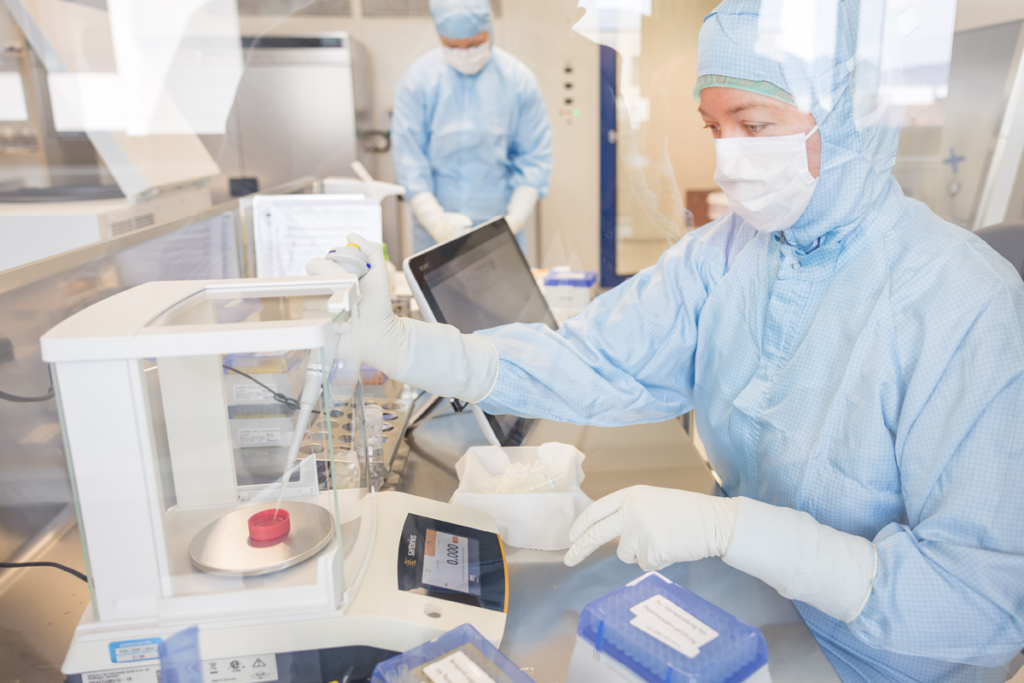
Vesicles have the ability to suppress inflammatory processes and thus reduce scarring. These properties offer numerous possibilities for application in modern medicine. In the renowned journal “Journal of Extracellular Vesicles”, Salzburg researchers Mario Gimona and Eva Rohde report on their research on vesicles and their help in healing hearing implants.
Hearing implants often associated with inflammation
Hearing loss is the most common neurodegenerative disorder in humans, affecting over 450 million people worldwide. For many patients, surgical insertion of a hearing implant is required. However, side effects can occur, such as acute or chronic inflammation due to the procedure itself or as a reaction to the foreign body. These can further damage the already diseased inner ear. The destruction of additional inner ear cells can lead to the complete disappearance of the remaining hearing ability. Currently, there are no accompanying therapies for the insertion of hearing implants.
Vesicle therapy protects the ear during hearing implantation
In their preliminary work, Salzburg researchers Mario Gimona and Eva Rohde were able to show that the administration of the so-called nanovesicular therapeutic after noise damage can protect the sensory cells in the ear and reduce hearing loss. The research was carried out in cooperation with the Hannover Medical School. Therefore, the scientists suspect that vesicles from human stem cells can exert therapeutic effects in the inner ear and alleviate inflammation.
In the journal “Journal of Extracellular Vesicles,” Salzburg researchers report on the world’s first administration of the therapeutic in humans. A 24-month follow-up period is part of the study.
A patient with bilateral hearing loss received the first hearing implant in 2014. In 2018, a second identical implant was inserted, this time in combination with simultaneous administration of the nanovesicular therapeutic. During the follow-up period, there were no medical abnormalities that suggest a problematic reaction of the body to the therapeutic. On the contrary, an improvement in speech understanding was observed on the side where the therapeutic was applied. A further clinical study is currently being prepared.
Salzburg as a pioneer in vesicle research
Research in modern regenerative medicine has evolved over time from the study of precursor cells to tissue cells. This has led to the concept of using only extracellular vesicles instead of their viable parent cells. Observations of improved regeneration after strokes as well as attenuation of nerve inflammation and scar formation after spinal cord injuries have strengthened the concept of using extracellular vesicles to treat neurodegenerative diseases.
These therapies are therefore manufactured in Salzburg under the highest quality standards. The GMP laboratory of the Center for Spinal Cord and Tissue Regeneration (SCI-TReCS) at the Paracelsus Medical University Salzburg (PMU) is involved. GMP stands for Good Manufacturing Practice, which also means compliance with pharmaceutical guidelines and regulations.
Research center for therapeutic use
The goal of the Salzburg researchers is to investigate the efficacy and safety of nanovesicular therapeutics in clinical studies. For this purpose, the Transfer Center for Extracellular Vesicles Theralytic Technologies (EV-TT) was founded in 2019 by Mario Gimona and Eva Rohde (PMU) together with Nicole Meisner-Kober (PLUS). The EV-TT develops new technologies for the therapeutic use of extracellular vesicles. The focus is on supporting healing processes and drug delivery. The EV-TT is a flagship project of the Science and Innovation Strategy (WISS 2025) of the state of Salzburg and is funded by the state and the European Regional Development Fund, Investments in Growth and Employment (IWB/EFRE).
This might also interest you
6. March 2025
salz21: Necessary Steps for the Future
On March 5, 2025, salz21 | Home of Innovation once again provided a platform for future topics, innovations, and interdisciplinary exchange. More than 1,000 visitors took the opportunity to learn about current developments and discuss perspectives for tomorrow. Three topics were particularly dominant: climate protection, artificial intelligence, and a strong Europe.
6. September 2024
Franz-Benjamin Mocnik researches the communication of places.
In Salzburg, there is an exciting digitization research project: Franz-Benjamin Mocnik is studying the communication of places for the Faculty of DAS.
5. June 2024
The Faculty of Digital and Analytical Sciences after 2 years – a review
Since its establishment two years ago, the Faculty at the Paris Lodron University of Salzburg has seen significant expansion. This was also supported by the State of Salzburg and Innovation Salzburg. On Tuesday, June 4, 2024, a review was presented at a press conference.
8. March 2024
How do we shape our future?
Political and technological challenges, as well as solutions to questions about the world of tomorrow, were discussed at the well-attended Innovation and Technology Forum salz21 on March 6th at the Salzburg Exhibition Center. Let’s take a look back at the panels organized by Innovation Salzburg.